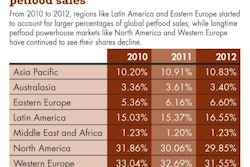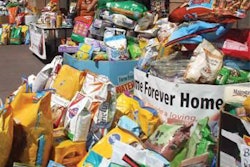"You know more about nutrition than you think you do." That was one of the messages Jennifer A. Larsen, DVM, PhD, DACVN, professor of clinical nutrition with the Veterinary Medical Teaching Hospital at the University of California-Davis (UC Davis), imparted to her audience of veterinarians during the American Veterinary Medical Association's (AVMA) annual convention, which just concluded in Chicago after a July 19-23 run.
Larsen added that vets do need to learn more about pet nutrition, especially when they have clients asking about preparing and feeding home-cooked diets for their pets (one of the topics she presented on). And I have to give credit to some for trying to do just that. Most of the nutrition sessions I attended at the AVMA convention were standing room only, whether they were about controversial topics such as raw petfood (which is controversial only because AVMA made it so) or more prosaic ones like omega-3 fatty acids (I couldn't even get into the room for that one, it was so full).
I was also heartened to see, in the exhibit hall, exhibitors like Hill's Pet Nutrition holding presentations encouraging vets to consider nutrition the "fifth vital assessment" when examining each patient. True, that message fits nicely into Hill's longtime strategy of marketing to the veterinary channel, which some people (including vets themselves) say is the only ongoing "education" vets receive about pet nutrition -- along with marketing from other petfood companies. And indeed, Hill's was also promoting a new food in its Prescription Diet line, Metabolic, which it claims is "clinically proven to work with eat pet's unique metabolic response" to help the pet lose body fat and maintain a healthy weight.
Still, props to Hill's for pushing a nutrition focus into vets' consciousness in terms of every examination, every patient -- not just when dealing with an eating problem or an overweight pet or when an owner asks about petfood. More medical doctors are asking about and advising on their human patients' diets and consumption habits as a regular protocol, and vets should be doing the same with pets. (Even though it's not exactly the same, since pets can't answer for themselves, not to mention determine what they eat.)
For her part, Larsen offered a balanced look at feeding home-prepared diets, giving just as many reasons to recommend against such diets as reasons for vets to help owners prepare home-cooked petfood. And to help vets know what to recommend when it is appropriate or necessary for a pet to receive such a diet, she cited numerous studies on home-cooked diets and their potential pitfalls and deficiencies. For example, she said even 64.5% of vet-created recipes found in books or online have been shown to be deficient in key nutrients, such as amino acids.
The session on raw petfood was presented by Larsen's colleague and mentor, Andrea J. Fascetti, VMD, Phd, ACVIM, DACVN, professor of nutrition in the Department of Molecular Biosciences within the veterinary school at UC Davis. While I don't agree with her conclusion and recommendation against feeding raw petfood "because the science doesn't support its benefits," at least she made her case based on science. She also acknowledged that there are few studies available on the benefits, at least compared with the number showing the potential safety dangers of handling raw petfood. Another acknowledgment was that some pet owners believe very strongly in feeding raw, so Fascetti recommended to the vets in the audience that if they have clients in that category, advise them to consult with a veterinary nutritionist and "school them on hygiene."
Is there still room for better education of vets -- and even veterinary nutritionists -- when it comes to pet nutrition and petfood? No doubt. But it's a step in the right direction that AVMA's annual convention included a day-long track on nutrition-related topics and most of the sessions were packed beyond full with veterinarians eager to learn about those topics.

















